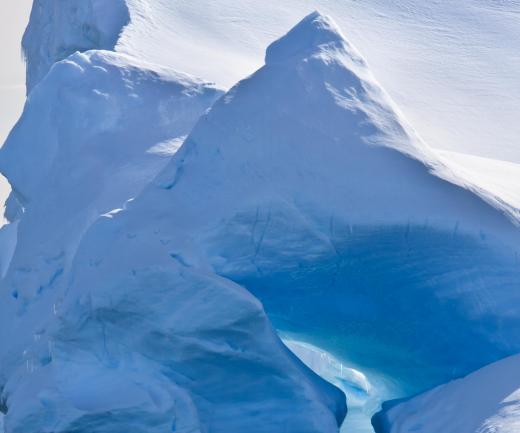Why does Ice Float?
 Mary McMahon
Mary McMahon
Many people have observed that ice floats in water, which seems to defy common sense, as most people expect solid forms of liquids to be heavier than their liquid forms. Like everything else that floats, ice floats because it is less dense than water, demonstrating the property of buoyancy. In addition, ice is also an illustration of the fascinating properties of water, a liquid which behaves in some very unusual ways.
When you see ice float, you are looking at a demonstration of the scientific principle of buoyancy. Objects are said to be buoyant when they are able to displace their own weight in water before sinking. As the object settles in the water, an equal force pushes up against the bottom of the object, causing it to float, rather than sink. When the surface area and density of a substance are right, that substance floats rather than sinking to the bottom.

In the case of most liquids, the cooler the liquid is, the more dense it becomes. Water, however, reaches its maximum density above the freezing point. As water freezes, its molecules arrange themselves into a matrix, creating spaces between them which didn't exist before. As a result, ice is around 9% less dense than water at its densest point, which makes ice float in water, rather than sinking.

However, you may have noticed that when you look at ice and water together, the ice doesn't just float on the surface; part of the ice is typically submerged. Sometimes, an entire piece of ice will be submerged, as is the case with ice cubes in a glass. In the case of something like an ice sheet in the Arctic, the huge surface area of the ice ensures that it will be buoyant, because it will displace its own weight before it sinks. A small piece of ice like an ice cube, on the other hand, may sink before it can displace its own weight.
The fact that ice floats is a fortunate thing for the natural environment. If ice sank to the bottom, the world's oceans, lakes, and rivers would slowly freeze from the bottom up, eventually turning into solid ice. Instead, ice floats along the surface, gradually melting down in response to temperature changes, except for the Arctic and Antarctic regions, where permanent sheets of ice exist year round because the temperatures are so cool.
AS FEATURED ON:
AS FEATURED ON:












Discussion Comments
How can this be possible that the density of ice is less than water as the intermolecular spaces in the solids are less and that in liquids.So its common sense (which you don't have) that the density of ice is greater than water. OK so check once and then post your views and all. Got it.
@ GlassHouse- The reason why ice floats in water has to do with density (as the article said), but the reason that ice is less dense than water has to do with the molecular structure of water in its different physical states.
The densest form of water is when it is in its liquid form. When it is in its liquid form, water molecules are jumbled, but tightly packed, together. Water molecules are composed of one large oxygen model, and two smaller hydrogen atoms. The molecules shape allows them to wedge tightly.
Water molecules in ice line up in a structured matrix when it freezes. These frozen water molecules cannot pack together as tightly as liquid water molecules, meaning that there are fewer molecules in a specific volume of ice as there are in the same volume of water.
Remember, density is a measure of relative mass per specific unit of volume.
I understand that ice cubes float because they are less dense than the surrounding water. What I don’t understand is why water in its solid state is more dense than water in its liquid state. From what I understand, most solids are denser than their liquid form (i,e, iron, gold, etc.). Can someone explain to me water acts differently than many other substances. Thanks!
Post your comments